
Toshiba EMI Odeon and Apple Label
04. The Best Of The Beatles (OP-7177: Cancelled)
(Update: 24th. July 2014)

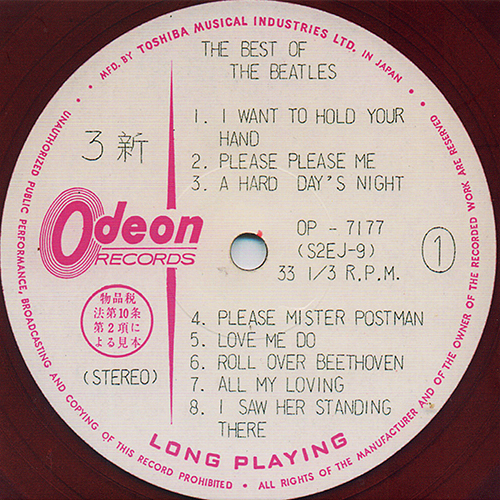 Odeon Promotional Record |
|
| TITLE | THE BEST OF THE
BEATLES |
||||
| CATALOG NUMBER | OP-7177 |
||||
| RELEASE DATE | Promotional
Record
/ 25th February.1965
(Cancelled) |
||||
| TRACK LISTING | SIDE 1 | SIDE 2 | |||
| I
Want To Hold Your Hand |
Twist
And Shout |
||||
| Please
Please Me |
I
Should Have Known Better |
||||
|
A Hard Day's Night |
She Loves You (sim. stereo) |
||||
|
Please Mister Postman |
Can't Buy Me Love |
||||
| Love Me Do (sim.
Stereo) |
I Wanna Be Your Man | ||||
| Roll Over
Beethoven |
Long Toll Sally | ||||
| All My Loving |
Do You Want To Know A Secret | ||||
| I Saw Her Standing There |
P.S. I Love You (sim. stereo) |
||||
| SAMPLE COVER:FRONT | SAMPLE
COVER:BACK |
SIDE 1 --> Click! | SIDE 2 --> Click! | DISK | |
| LOST Illustrated the four yellow chicks. (maybe) Designed by Claude Okamoto |
Unknown |
 |
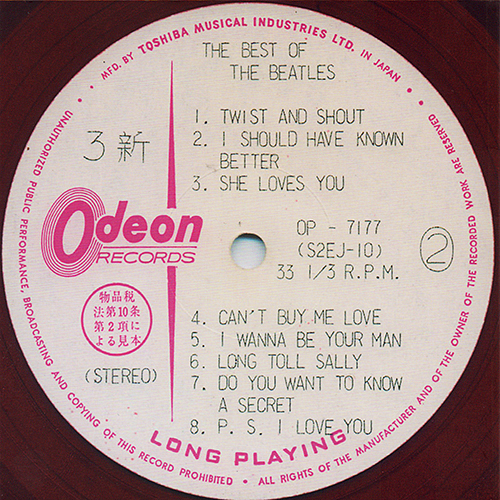 |
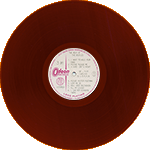 |
|
| INNER
SLEEVE |
LABEL CLOSE UP | ||||
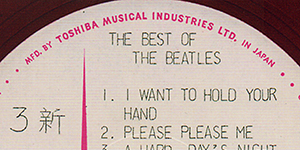 |
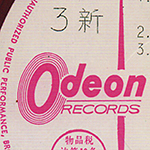 |
Odeon white
label
(promotional use only). The words "MFD. BY TOSHIBA MUSICAL INDUSTRIES LTD. IN JAPAN" was printed at the perimeter. The release date (month: March) is in black and appears above and to the left of the Odeon logo. |
|||
| LABEL CLOSE UP | |||||
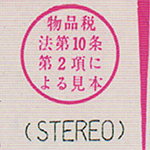 |
Here is a close-up of the
circled text: "Sample under Article 10, Clause 2 of the
Commodity Tax
Law". |
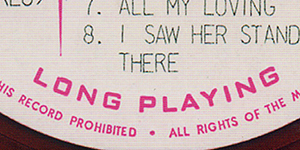 |
The print in black
has unusual "hand lettered" look to it quite unlike the
regular
commercial version. The words "LONG PLAYING" was printed at the bottom of the label. |
||
| LABEL CLOSE UP | |||||
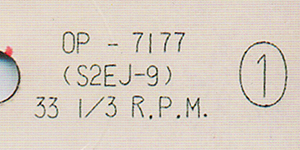 |
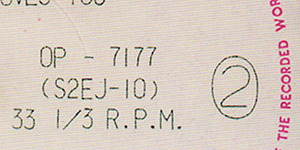 |
Catalog number and matrix
number were printed at the right side of the
center hole on both sides. |
|||
| LABEL CLOSE UP | |||||
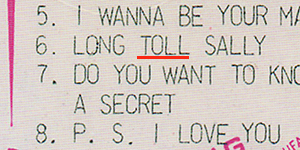 |
About the song
title of the 6th. song on side-2, this label was misprinted
"LONG TOLL SALLY"
instead of "LONG TALL
SALLY" |
||||
|
OTHER ITEM
|
|||||
| - | |||||
| RECORD LABEL | Odeon
White Label (for promotional use only) |
||||
| MIX | STEREO
(except as noted) |
||||
| MATRIX No. | SIDE 1 | S2EJ-9 |
|||
| SIDE 2 | S2EJ-10 | ||||
| PRESS MARK | None
(maybe) |
||||
| VINYL COLOR | RED |
||||
| RECORD COMPANY'S NAME | SLEEVE | - |
|||
| LABEL | MFD. BY
TOSHIBA
MUSICAL INDUSTRIES LTD. IN JAPAN |
||||
| SYMBOL/PRICE | - |
||||
| LYRIC SHEET STYLE | - |
||||
| COVER FORM | - |
||||
| INNER
SLEEVE |
Plain
White Inner bag (maybe) |
||||
| OBI |
- |
||||
| COVER DESIGN/ PHOTO/ NOTES |
Illustrated the four yellow chicks. (maybe) Designed by Claude Okamoto |
||||
|
COMMENTS
|
Odeon white label
(promotional use only). The words "MFD. BY TOSHIBA MUSICAL INDUSTRIES LTD. IN JAPAN" was printed at the perimeter. Unreleased compilation red vinyl. Only promotional pressing exists and has no cover art This album is the ill-fated Toshiba EMI project that never saw the light of day. London EMI didn't permit them to release it. Odeon promo LPs feature the perimeter print, Odeon logo, and circled text in red and all other printing in "hand lettered" black. Note the release date above the Odeon logo. The label design is similar to that used for the regular commercial Odeon LPs. These are most commonly found on red vinyl. In Japan, promotional records have traditionally been provided at no charge to radio stations, record shops, and the mass media to increase the sales of a record or in some cases to promote a tour. There are two types of promotional releases. Type-1: This type is called the white label promo for which a unique label has been made. The label design of Odeon white label singles is very similar to that of regular commercial Odeon singles. The promo version, however, features the perimeter print, Odeon logo, and circled text in red and all other printing in black. The print in black has an unusual "hand lettered" look to it quite unlike the regular commercial version. The release date is in black and appears above and to the left of the title. Most usually, the regular cover is used with appropriate alterations to prohibit commercial sale. Type-2: The second type of promo record is less elaborate and is called a sticker promo. It is simply a regular commercial release that has a promo sticker affixed to the cover. This type of promo is occasionally found on post-1975 releases. When the album was issued in Japan, Toshiba did a straight pressing from the American album, The left much to be desired as three of the tracks, “Penny Lane”, “Baby You’re A Rich Man” and “All You Need Is Love”, are in fake stereo. |
||||
